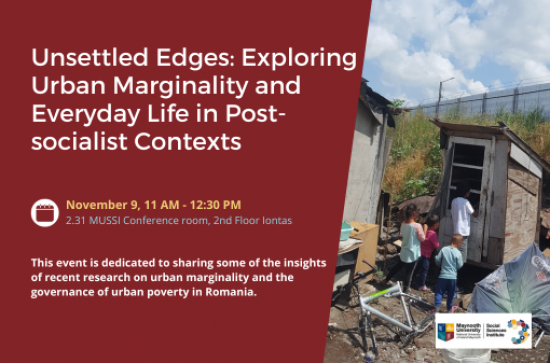
Maynooth University, Department of Anthropology supported by MUSSI,present this event dedicated to sharing some of the insights of recent research on urban marginality and the governance of urban poverty in Romania.
The aim is to “talk back” to research that originated in Western Europe and the US on the racialization of Roma in Eastern Europe by foregrounding gendered voices and experiences as well as the everyday unsettlements created by racial banishment and marginalization based on field research carried out in two Transylvanian cities between 2019 and 2023. This is achieved via two presentations which are summarized below.
1. The feminization of governing Roma marginality: A grounded exploration of its promise and limitations - Alina Pop, Filip Alexandrescu and Julia Adorjani
The paper delves into the governance of urban marginality in Central and Eastern Europe (CEE), specifically focusing on the interplay between the Wacquatian perspective on state involvement in urban marginality and the gender dimension of this governance. Traditionally, studies of state involvement in managing urban marginality have concentrated on the content of policies and services, neglecting the examination of their modes and forms. Our research aims to shed light on the modalities of implementing "left hand" functions and the role of women involved in decision-making and administrative processes, through a case study linked to a sudden crisis in urban governance – a fire incident and the subsequent relocation of a Roma community in the Transylvanian city of Miercurea Ciuc. Based on two rounds of interviews in Târgu Mureș and Miercurea Ciuc (2019 and 2022/23), we reveal a distinctive and progressive shift in approaching urban marginality and particularly those forms related to crisis management. We attribute this shift to a feminised version of urban governance, which we contrast with previous masculine forms. While underlining the increase in the responsiveness of women incumbents to the challenges facing the Roma, we also draw attention to the limitations of these feminised forms of governance, as they are unable to achieve structural change and instead tend to reproduce neoliberal forms of discipline.
2. How many ways to differentiate the Other? Marginalized Roma and the unsettlement of everyday life - Filip Alexandrescu, Ionut Anghel, Ryan Powell and Cătălin Berescu
The history of the Roma in Romania includes slavery, dehumanising indifference, racialized inferiority and spatial seclusion, albeit alongside more ambivalent relations and Roma heterogeneity. Over the last few decades, a flurry of efforts to marginalise the racialized Other in several Romanian cities have brought to the fore deep unsettlements of everyday life in these cities. In this paper we aim to foreground these processes of unsettlement viewed as a dialectic between settling an emerging neoliberal urban order and unsettling other ways of life. We follow these unsettlements along a historical pathway from socialism, through early post-socialism and culminating in the financial post-socialism of the last two decades. We thus offer unsettlement as a way to orient our understanding of class-based and racialized Otherness, one that is historically grounded yet experientially connected to the everyday lives of urban poor in Romanian cities and beyond.
Short bios of the speakers
Dr. Alina Pop is a senior researcher at the Research Institute for Quality of Life of the Romanian Academy. Her research work encompasses a wide range of areas including environmental risks, climate change vulnerabilities, and social representations in mining conflicts. She has been recently involved in two national research projects dealing with climate vulnerabilities among marginalized Roma communities from Romania. She published several articles on the topic, such as Alexandrescu, Filip Ionuț Anghel, Simona Stănescu, Lucrina Ștefănescu & Alina Pop (2022). From environmental to climate justice: social-environmental expulsions and the emergence of a climate edge in Europe, published in Globalizations, and Alexandrescu, Filip, Ionut Marian Anghel, Julia Adorjáni, Lucrina Ștefănescu, Alina Pop, Anca Mihai (2021). On the path of evictions and invisibilization: Poor Roma facing climate vulnerability, published in Cities.
Dr. Ionuț Anghel is a trained sociologist and researcher at the Research Institute for Quality of Life of the Romanian Academy. His main areas of interest include racialization of poverty in urban contexts, governance in the European Union and social policies. He has worked in research projects and policy-oriented research that used both quantitative and qualitative methods of data collection. He co-authored several articles on vulnerabilized Roma communities in Romania, such as Filip Alexandrescu, Ionuț-Marian Anghel, Júlia Adorjani, Lucrina Ștefanescu, Alina Pop and Anca Mihai (2021). On the path of evictions and invisibilization: Poor Roma facing climate vulnerability, published in Cities, Cătălin Berescu, Filip Alexandrescu and Ionut Marian Anghel (2021). Vulnerable Roma communities in times of the Covid-19 negative quarantine, published in Moravian Geographical Reports, and Ionut Marian Anghel and Filip Alexandrescu (2022). ‘We lurk in the hidden places’: The (un)stable spatialisation of Roma poverty in Romania, published in Urban Studies.
Regiatration required -
please email [email protected] if you have any issues registering
